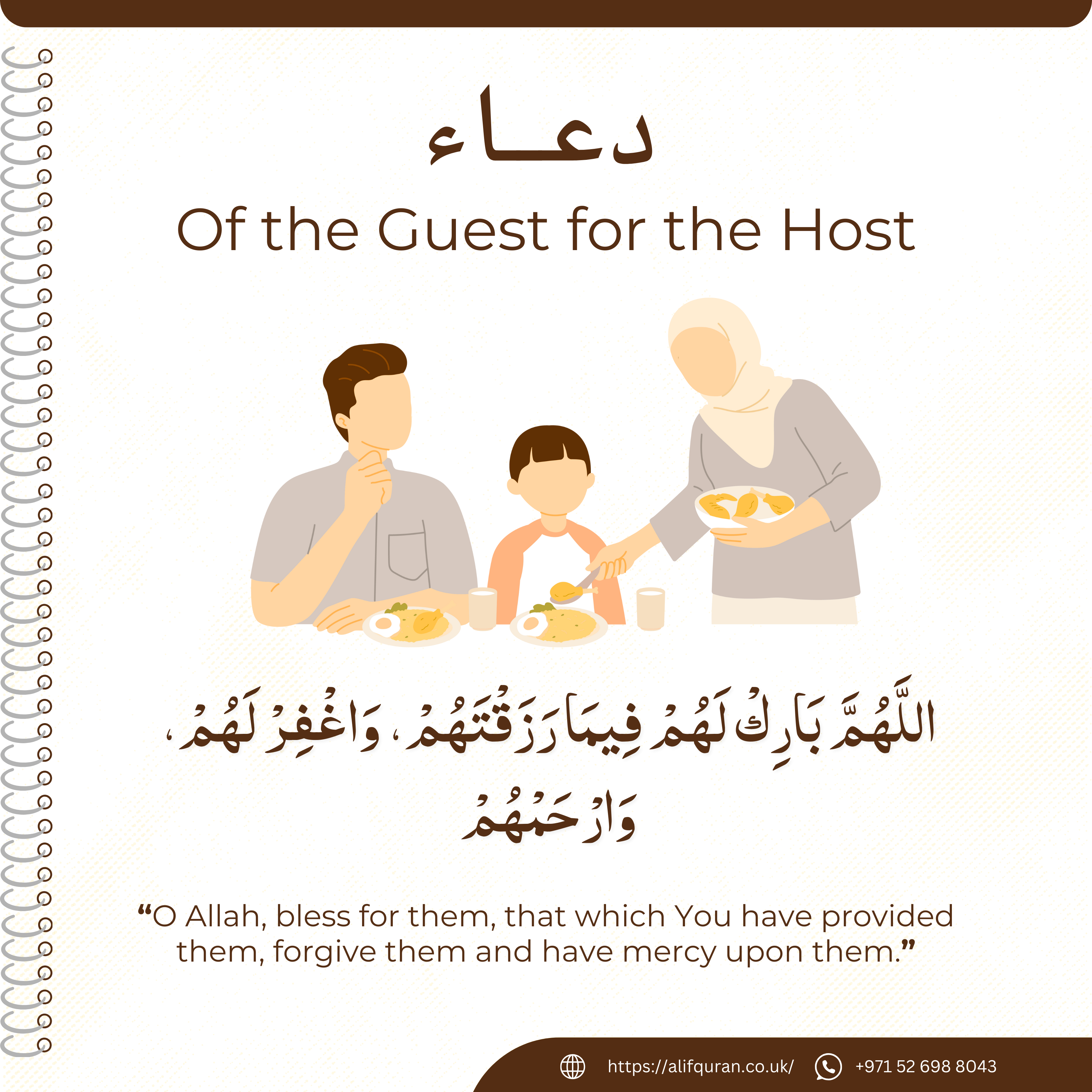Dua When Eating at Someone else House

Dua When Eating at Someone Else’s House (Supplication in Arabic & English Translation)
When visiting someone’s home for a meal, the Prophet ﷺ recommended saying the following dua:
Arabic:
اللَّهُمَّ بَارِكْ لَهُمْ فِيمَا رَزَقْتَهُمْ وَاغْفِرْ لَهُمْ وَارْحَمْهُمْ
Transliteration:
Allahumma barik lahum fī mā razaqtahum, waghfir lahum, warhamhum.
English Translation:
“O Allah, bless them in what You have provided for them, forgive them, and have mercy upon them.”
This dua asks Allah to bless the host, forgive their sins, and grant them mercy—making it a meaningful supplication that strengthens bonds between guests and hosts.
Why Expressing Gratitude is Important in Islam?
Gratitude is a central theme in Islam. Eating at someone else’s house is not just about enjoying a meal—it is an opportunity to show appreciation and strengthen relationships.
Allah says in the Quran:
“If you are grateful, I will surely increase your favor…”
(Surah Ibrahim 14:7)
The Prophet ﷺ also emphasized saying JazakAllah Khair (May Allah reward you with goodness) to those who do us a favor, including providing food.
The Etiquette of Eating at Someone Else’s House in Islam
Islam teaches beautiful manners for dining as a guest. Here are some key etiquettes:
1. Accepting Invitations Gracefully
The Prophet ﷺ said:
“When any of you is invited to a meal, he should accept it. If he is fasting, he should make dua for the host; if he is not fasting, he should eat.” (Sahih Muslim 1431)
Accepting an invitation is a way of showing respect and appreciation. If unable to attend, it is courteous to inform the host in advance.
2. Making Dua Before and After Eating
Before eating, say:
بِسْمِ اللَّهِ (Bismillah – In the name of Allah)
After eating, recite:
الْحَمْدُ لِلَّهِ الَّذِي أَطْعَمَنَا وَسَقَانَا وَجَعَلَنَا مِنَ الْمُسْلِمِينَ
(All praise is due to Allah, who has fed us, given us drink, and made us Muslims.)
3. Eating with Right Hand & Moderation
The Prophet ﷺ advised:
“Eat with your right hand and eat from what is nearest to you.” (Sahih al-Bukhari 5376)
He also encouraged moderation:
“The son of Adam does not fill a vessel worse than his stomach.” (Sunan Ibn Majah 3349)
4. Avoiding Wastefulness
Allah warns in the Quran:
“Indeed, the wasteful are brothers of the devils.” (Surah Al-Isra 17:27)
Taking only what we need and finishing our food prevents waste and earns barakah (blessings).
5. Complimenting the Host’s Food
The Prophet ﷺ never criticized food. If he liked it, he ate it; if not, he left it without complaint. A good guest praises the meal and thanks the host.
The Importance of Hospitality in Islam
Islam encourages generosity and hospitality, as seen in the story of Prophet Ibrahim عليه السلام. When guests visited, he immediately prepared a meal for them, showing kindness.
The Prophet ﷺ said:
“Whoever believes in Allah and the Last Day, let him honor his guest.” (Sahih al-Bukhari 6136)
Providing food is a highly rewarded act in Islam. Even feeding animals carries great reward!
Benefits of Reciting the Dua When Eating at Someone Else’s House
1. Increases Blessings for the Host
When a guest recites this dua, Allah increases the sustenance of the host, filling their home with barakah.
2. Strengthens Friendships and Bonds
Expressing gratitude through dua creates love and harmony between families and friends.
3. Follows the Sunnah of the Prophet ﷺ
Practicing this dua revives a forgotten Sunnah, earning spiritual rewards.
4. Earns Allah’s Mercy and Forgiveness
The dua asks for mercy and forgiveness, not just for the host but also for the guest who recites it.
FAQ
Can I say this dua silently?
Yes, you can say it silently or out loud. If said aloud, it reminds others of the Sunnah.
Should I recite this dua before or after eating?
It is best recited after eating to thank the host.
Is it necessary to finish all the food on my plate?
While not obligatory, it is recommended to avoid waste by taking only what you can eat.
Can I recite this dua when eating at a restaurant?
Yes, though primarily for home settings, you can still say it for anyone providing food.





